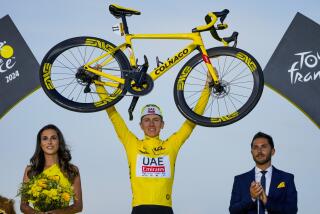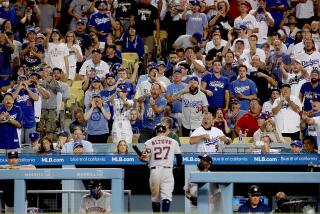Resuming his French connection
- Share via
LONDON — Lance Armstrong’s return to the race that made him a supernova reintroduces one of the touchier cases of fan-athlete rapports, the occasionally prickly interplay between the cyclist who once dominated a revered 106-year-old race in a foreign country and the citizens of the country with the revered 106-year-old race.
As the Tour de France participants and Tour de France oglers gathered in Monaco, fans reportedly cheered Armstrong, and earlier in the week the superstar cyclist from Texas told the Associated Press in a telephone interview that he had seen “thousands” of supportive French fans as he made pre-race preparations in the Alps.
He called concerns overblown.
Such a scenario clashes with a widely begrudged image of Armstrong as unpopular in France, the country of 60 million where Armstrong won an unprecedented seven Tours de France and a reputation for a corporate coldness.
It’s a relationship that coursed from 1999 to 2005 and beyond, through frosty early days decorated by his inability to speak French, through a palpable defrosting in later days as he strained to win their hearts, through even some spillover of disgruntlement from the Iraq war, and then, after the whole seven years had finished, through a report by the French sports daily L’Equipe later in 2005 that some of Armstrong’s urine samples from 1999 contained the banned drug EPO (though a Dutch report later cleared Armstrong, citing improper handling and testing).
“It’s complicated,” said Patrick Mignon, a sociologist at the Institute for Sport and Physical Education.
In a poll published Thursday in L’Equipe, which inquired as to whether respondents felt “bothered” by Armstrong’s presence, 72% replied non while 27% answered oui.
Among those describing themselves as Tour de France enthusiasts, the numbers shifted to 58% for non and 42% for oui.
Asked if Armstrong’s presence increased their interest in the race, 91% of general fans replied that it did not, while 80% of ardent cycling fans answered likewise.
Fifty-five percent of the general public who responded thought Armstrong could win, while 44% felt he could not, and 26% of the general public thought he would win the race, while 13% of hard-core cycling enthusiasts forecast him as winner, placing him second well behind Alberto Contador, who snared 41%.
Around the country, it’s possible to run across a waiter in Nice on the Mediterranean who wears a yellow Armstrong bracelet, claims to belong to a diligent cycling club, expresses devout admiration for the rider’s capabilities and says he can’t wait for the return. It’s also possible to find a leader of a cycling club in Paris who states the return troubles him because, well, he takes pains to say he’s sorry, but he does not consider Armstrong clean.
“I’ve had a lot of discussions with people who are big fans of cycling,” Mignon said. “You know, the first fact to know about cycling in France is that the people who like the Tour de France and cycling feel very much like they’re victims because cycling is condemned from everywhere. This is the first thing to know.
“In that context, people are divided between two positions. On one side they say Armstrong is like everybody else in cycling, no problem. On the other side people say Armstrong is a symbol” of the ills.
The former side maintains that “everybody takes drugs but on the other side, there’s also somebody doing very hard work so if he wins something it should be considered to be good,” Mignon said.
The other side, he said, weighs heavily those 1999 samples and deems them “proof that something wasn’t normal. . . . It was an argument that Armstrong could not really be the champion.”
That means a curious question for 2009 will entail whether any fans shout doping allegations at Armstrong, who has never tested positive, especially after the Tour in recent years has gone beset with expulsions and even the removal of a title from the 2006 winner Floyd Landis.
Occasional catty turns had marked the months leading into Armstrong’s return. Last fall, months before calling concerns about the fan-athlete relationship overblown, Armstrong inflated them.
He expressed guardedness about what might come from French fans, illustrating that worry by citing the L’Alpe Huez mountain stage in 2004, when some fans spat on him, threw beer at him and hollered insults as he rode on.
Come June, the French daily Le Parisien quoted Bernard Hinault, the last Frenchman to win the Tour and the five-time champion known as “the Badger,” saying of Armstrong, “I hope he will not be there. Is he afraid of France? Nobody forced him to come. He only has to stay home! He cannot win the Tour. I hope that Contador gives him a beating.”
Long ago in 1999, Armstrong first won the Tour at 27 after recovering from testicular cancer, but the emphatic nature of his wins left some fans cold, and he differed in sheen from Greg LeMond, the three-time American winner who qualified as beloved.
The French knew Armstrong as a kind of “avant-garde” champion of “coldness, emotional distance, very rational, very much a matter of business,” Mignon said.
“Armstrong came and he did not play the game, the game of the traditional culture of cycling.”
Then he won seven times, more than the record five, and there was almost a sense of, “Is he Martian? He comes from Mars?”
By now, as the stages of the Tour hog the attention, the latest stage of the connection between the fans of the Tour and the Tour’s most world-famous rider at 37 might siphon off some.
--
More to Read
Sign up for Essential California
The most important California stories and recommendations in your inbox every morning.
You may occasionally receive promotional content from the Los Angeles Times.










